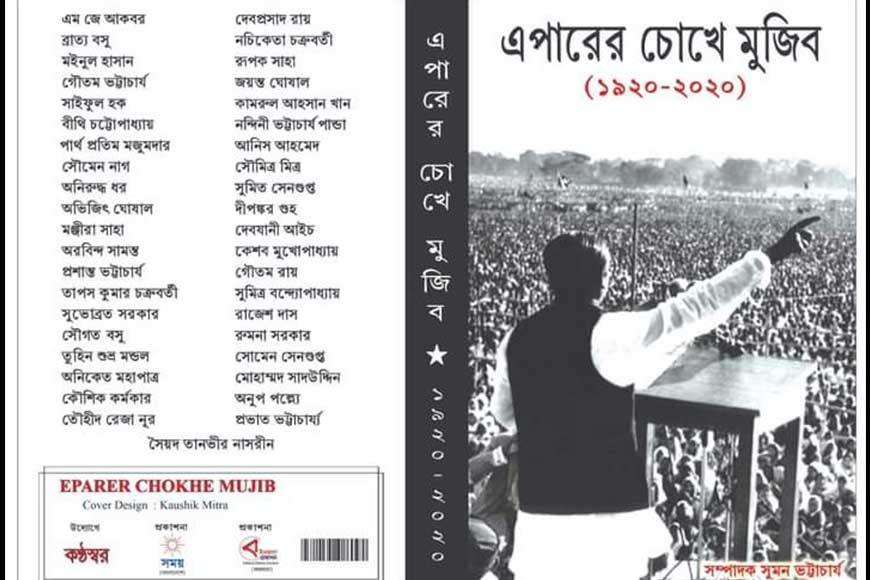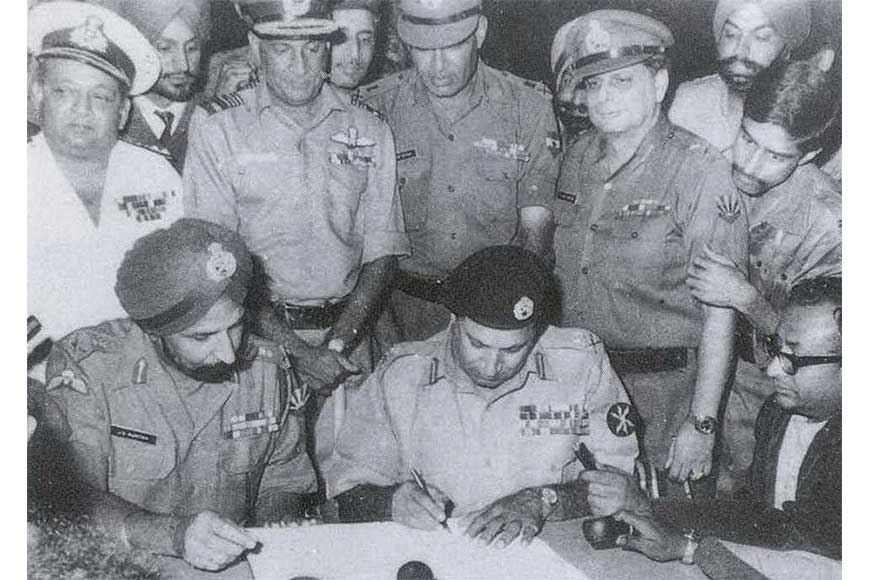On Vijay Diwas, remembering the man who gave Bangla its identity

The only man to have created a Bengali nation. Whatever else history remembers about ‘Bongobondhu’ Sheikh Mujibur Rahman, this fact remains inescapable. Approaching the half-century of the liberation of Bangladesh, a Kolkata publisher has brought out an anthology of writings edited by Suman Bhattacharyya titled ‘Eparer Chokhe Mujib’, an evaluation of the man and the politician in the eyes of commentators primarily from this side of the border. Coincidentally, 2020 also marks his birth centenary, the observation of which has inevitably been curtailed by the Covid pandemic.
Every year, December 16 is celebrated as Vijay Diwas (বিজয় দিবস in Bangla) in both India in Bangladesh to honour Bangladeshi and Indian soldiers and fighters who lost their lives in the 1971 Bangladesh Liberation War, which lasted nine months, fittingly enough, and gave birth to the new sovereign nation of Bangladesh, led by Sheikh Mujib. A nation which arose from the ashes of erstwhile East Pakistan, until then part of the Islamic Republic of Pakistan.
 Signing of the Instrument of Surrender by Pakistan's Lt Gen A. A. K. Niazi to the commander of Indian armed forces, Lt Gen Jagjit Singh Aurora in Dhaka on December 16, 1971
Signing of the Instrument of Surrender by Pakistan's Lt Gen A. A. K. Niazi to the commander of Indian armed forces, Lt Gen Jagjit Singh Aurora in Dhaka on December 16, 1971
India’s brief involvement in the war came about as a result of 11 of its air stations being pre-emptively bombed by Pakistan, which opened up the Eastern Theatre in the 1971 Indo-Pak conflict, a war within a war. This one, however, lasted a mere 13 days, at the end of which Lt Gen Amir Abdullah Khan Niazi signed and handed over the Instrument of Surrender to Lt Gen Jagjit Singh Aurora, Joint Commander of Indian and Bangladesh Forces. Thus did the Pakistan Eastern Command surrender in the Bangladesh Liberation War, and the Indo-Pakistani War of 1971 in the Eastern Theatre also came to an end.
Every year, December 16 is celebrated as Vijay Diwas (বিজয় দিবস in Bangla) in both India in Bangladesh to honour Bangladeshi and Indian soldiers and fighters who lost their lives in the 1971 Bangladesh Liberation War, which lasted nine months, fittingly enough, and gave birth to the new sovereign nation of Bangladesh, led by Sheikh Mujib.
While human history is no stranger to armed conflicts, the Bangladesh Liberation War remains one of the most violent wars of the 20th century, resulting in the exodus of nearly 10 million refugees, and the killing of nearly 3 million people by the Pakistani armed forces.
To put it baldly, when Sheikh Mujib assumed charge of this ravaged nation, nobody seemed to know the direction it would take. That it has completed nearly 50 years as an independent country is largely a result of Mujib’s initial leadership, as well as his considerable legacy. Assassinated just four years after Bangladesh gained independence, Mujib remained engaged in the immense task of nation-building, a job that inevitably brought him as many bouquets as it did brickbats.
Also read : A museum that keeps the truth of 1971 alive
And the new anthology encompasses almost every aspect of both his life and his legacy. In the words of its editor, author and journalist Suman Bhattacharyya, “If for nothing else, Bongobondhu Sheikh Mujibur Rahman’s name will be remembered even 500 years from now, for shaping a distinct identity for Bengalis, for making Bangla an international language. In order to achieve both, it was critical that Bangladesh emerge as a separate nation.”
Comprising 41 essays, the book has contributions from 36 Indians and five non-resident Bangladeshis. The Indian contributors range from former foreign minister and veteran journalist M.J. Akbar, to former Congress MP Debaprasad Roy, former CPIM MP Moinul Hasan, playwright and West Bengal minister Bratya Basu, noted Bengali singer Nachiketa Chakraborty, to journalists such as Jayanta Ghoshal, Goutam Bhattacharya, Rupak Saha, Mohd Saduddin, and scholars such as Syed Tanveer Nasreen, and history enthusiasts like Somen Sengupta.
The non-resident Bangladeshi contributors include distinguished mime artiste Parthapratim Majumdar, diplomat and former ambassador to Russia Saiful Hoque, former ‘Muktijoddha’ Kamrul Ahsan Khan, Voice of America journalist and writer Anis Ahmed, and Tauhid Reza Noor, whose father died in the war.
As Bhattacharyya says, “The aim of the book is to highlight how these distinguished contributors evaluate Mujib, 45 years after his death. I was determined to publish it before December 16, because today is not simply Bijoy Dibos for Bangladesh, it is also the day when Jinnah’s two-nation theory was blown to bits by Bongobondhu. A milestone day, when Southeast Asia’s map changed forever, and India let everybody know about its status as an Asian power.”
‘Eparer Chokhe Mujib’ (introductory price, Rs 400) has been jointly published by Konthoswor in India and Somoy Prokashon in Bangladesh. For home delivery, call 97484 12510










